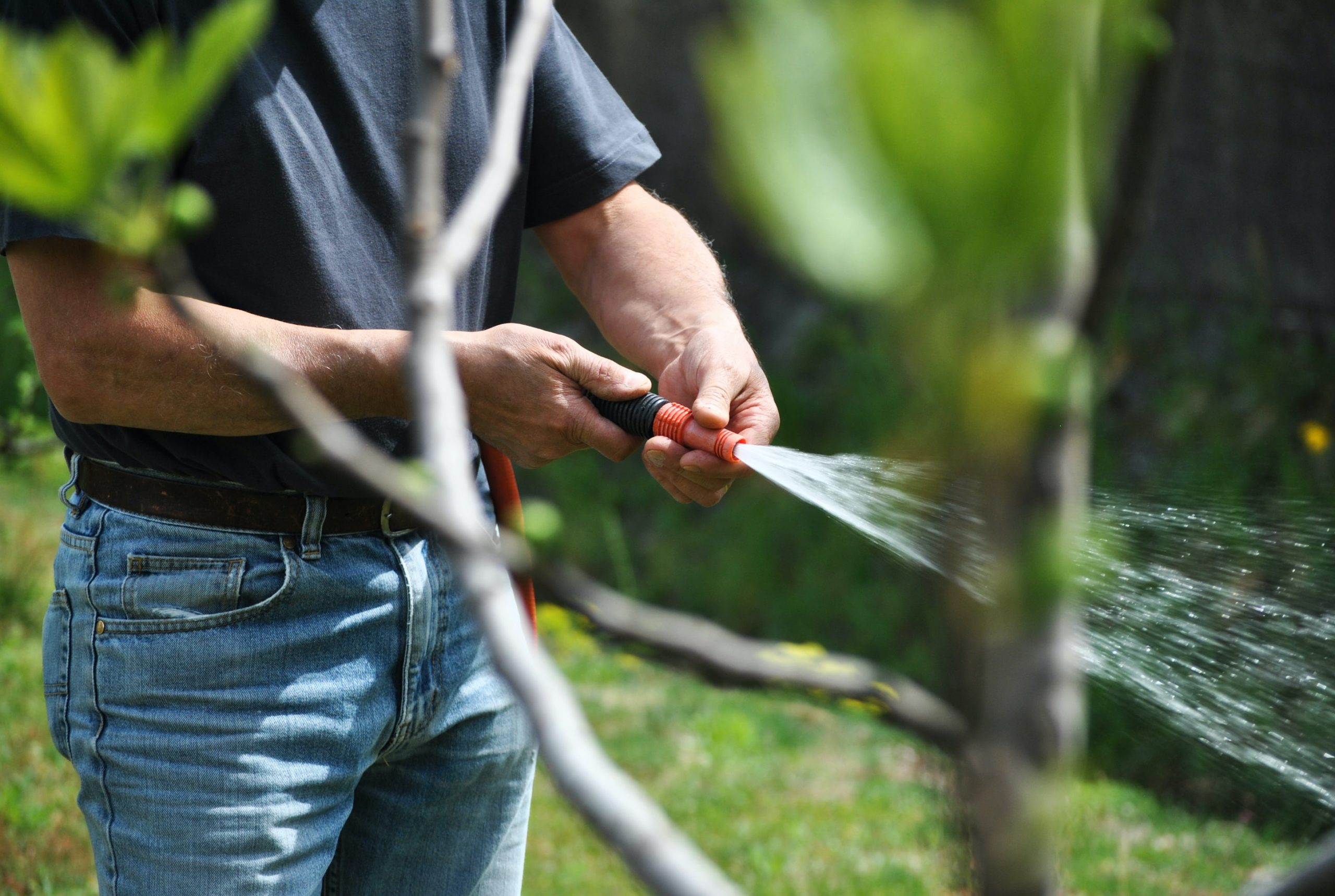Last Updated on April 11, 2024 by Real Men Sow
 Chemicals make drinking from garden hoses quite unsafe. Many garden hoses are contaminated with harmful substances such as bromine, phthalates, and BPA.
Chemicals make drinking from garden hoses quite unsafe. Many garden hoses are contaminated with harmful substances such as bromine, phthalates, and BPA.
Some specialty hoses can be used to make water safe, but it is important that you verify their safety.
Ever felt tempted to grab a quick drink from the hose during a hot summer day? Even though the water is cool and refreshing, it can be a lot easier than going inside the house.
You may wonder, “Is it safe for me to drink from my garden hose?” It is not, because the hoses can leak harmful chemicals into the water.
Today’s guide will walk you through the dangers of garden hose water, and how to keep yourself safe.
What Are The Risks Of Drinking From A Garden Hose?
Because it is not part of the design, most garden hoses can’t be used for drinking water. You should not drink the hose material or the brass fittings.
Bacteria
The risk of getting harmful bacteria from hose water is increased. Because garden hoses are often exposed to the sun, they can become a breeding ground of microorganisms. The Legionella bacteria can sometimes grow in garden hoses. You can get it by inhaling water from the hose ends or simply drinking the water.
This bacteria can be very dangerous because it can cause serious health problems. Legionnaires disease . This disease causes inflammation and pneumonia in the lungs. This disease can be treated with antibiotics but it can sometimes prove fatal.
Phthalates
Your garden hose may leak phthalates to the water if it is made from plastic like PVC. These chemicals are sometimes called plasticizers and are added to plastic to make it stronger. A 2016 study compared popular garden hoses to determine if they contained high levels of phthalates.
While scientists are still researching, studies have shown that phthalates could cause cancer or chronic disease. You may also experience nausea, skin irritation, dizziness and vomiting.
BPA
BPA was also found in water that had been sat in hoses during the same study that discovered phthalates. It could also be found in small amounts of water that remains after you have finished watering your garden.
BPA is a chemical that can cause harm. It has been shown to cause brain damage and cancer, as well as high blood pressure and cardiovascular problems.
Lead
Hose water can also contain lead. Lead is more common in brass fittings. However, PVC attachments may contain higher levels. The study showed that at least one third of tested hoses contained more than 100ppm lead.
The Centers for Disease and Control Prevention recommend children not be exposed to more than 5 mg per deciliter (0.05ppm). This is a high level of lead in many hoses.
High levels can cause severe health problems and even death for humans. It can lead to a number of health problems, including:
- Lead poisoning
- Brain and kidney damage
- Stillbirths and miscarriages
- High blood pressure
- Heart and kidney diseases
- Fertility issues
- Cancer
Tin
Tin levels in PVC hoses can range from 3000 to 4000ppm. This is problematic as tin levels greater than 200ppm in food or drinks can be considered to be harmful.
Tin can protect the PVC from heat and sunlight, but it can also cause health problems. Although Tin can have a positive effect on the body it can also cause side effects such as nausea, gastrointestinal pain, diarrhea, and stomach upsets.
Bromine
Bromine levels were found in over one-third of all garden hoses tested during the study. Each hose was made from PVC with some registered bromine levels exceeding 1000ppm.
Bromine is a common fire retardant. It protects the hose from burning and improves its stability. Bromine can cause the following health effects if it is ingested in water:
- Gastrointestinal issues such as nausea and vomiting
- Low blood pressure
- Brain and kidney damage
Washing Garden Vegetables With Hose Water – The Facts
You may wonder if you’re transferring the harmful chemicals into your plants? Are you also eating the vegetables and fruits that are contaminated by the water?
Some research suggests that vegetables may contain trace amounts of lead or phthalates. There is not enough evidence to prove that they are derived from water. If you are going to eat vegetables from your own garden, I would recommend a water-safe hose.
The 3 Best Drinking-Water Safe Garden Hoses
Some hoses are water-safe, and the following hoses have been tested for lead and phthalate:
This doesn’t mean the hoses will be free of bacteria. There are additional precautions that you need to take. Avoid PVC as it can contain toxic chemicals. Rubber, steel or polyurethane are recommended.
You should also choose brass-free fittings, don’t worry, there are many options of hose fittings made from stainless steel, aluminum or nickel. These metals are less likely than brass to leak lead into water.
Before buying a hose, you should do your research. While some brands advertise that they are safe for drinking water, others still present hazards. You should not use a hose that contains California Prop65. This could lead to cancer and birth defects over the long-term.
How To Drink Garden Hose Water Safely
These are steps you can take to minimize the risk of getting sick if you insist on drinking water from the hose:
Let The Water Run
Allow the water to run through your hose for several seconds before you consume it. This will help eliminate bacteria and other harmful substances. While you wait for the water to become safe to drink, you can direct your hose to the lawn and other plants.
Keep It Out Of The Sun
Your hose can become more dangerous if it is left out in the sun. Heat can cause bacterial growth to increase and chemicals to leak into the water. It’s best to purchase a Hose reel and you can place it in your garage or storage shed. You can also keep it outdoors by placing it under a tree, or in another shaded area. Be aware that the extension may be added to the hose reel. It must be safe for drinking too!
Keep It Away From Children And Pets
Children have more sensitive immune systems so it is important that you do not allow your child to drink from a hose. Talking about possible dangers with your child is possible if they are old enough. You must also keep an eye on them while they are out in the garden, with the water hose running.
You should use the same precautions as you would to fill your pet’s water bowl with hose water. Allow the water to run for at least a few minutes before you fill it. Never use hot water from a hot hose.


